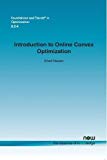Download Introduction to Convex Optimization PDF Free - Full Version
Download Introduction to Convex Optimization by Elad Hazan in PDF format completely FREE. No registration required, no payment needed. Get instant access to this valuable resource on PDFdrive.to!
About Introduction to Convex Optimization
<p>This book serves as an introduction to the expanding theory of online convex optimization. It was written as an advanced text to serve as a basis for a graduate course, and/or as a reference to the researcher diving into this fascinating world at the intersection of optimization and machine learning.</p><p>Such a course was given at the Technion in the years 2010–2014 with slight variations from year to year, and later at Princeton University in the years 2015-2016. The core material in these courses is fully covered in this book, along with exercises that allow the students to complete parts of proofs, or that were found illuminating and thoughtprovoking. Most of the material is given with examples of applications, which are interlaced throughout different topics. These include prediction from expert advice, portfolio selection, matrix completion and recommendation systems, SVM training and more.</p><p>Our hope is that this compendium of material and exercises will be useful to you; the educator and the researcher.</p><p>Book’s structure</p><p>This book is intended to serve as a reference for a self-contained course for the educated graduate student in computer science/electrical engineering/operations research/statistics and related fields. As such, its organization follows the structure of the course “decision analysis” taught at the Technion.</p><p>Each chapter should take one or two weeks of classes, depending on the depth and breadth of the intended course. The first chapter is designed to be a “teaser” for the field, and thus less rigorous than the rest of the book.</p><p>Roughly speaking, the book can be thought of as two units. The first, from chapter 2 through 5, contains the basic definitions, framework and core algorithms for online convex optimization. The rest of the book deals with more advanced algorithms, more difficult settings and relationships to well-known machine learning paradigms.</p>
Detailed Information
| Author: | Elad Hazan |
|---|---|
| Publication Year: | 2015 |
| ISBN: | 1680831704 |
| Pages: | 191 |
| Language: | other |
| File Size: | 4.2177 |
| Format: | |
| Price: | FREE |
Safe & Secure Download - No registration required
Why Choose PDFdrive for Your Free Introduction to Convex Optimization Download?
- 100% Free: No hidden fees or subscriptions required for one book every day.
- No Registration: Immediate access is available without creating accounts for one book every day.
- Safe and Secure: Clean downloads without malware or viruses
- Multiple Formats: PDF, MOBI, Mpub,... optimized for all devices
- Educational Resource: Supporting knowledge sharing and learning
Frequently Asked Questions
Is it really free to download Introduction to Convex Optimization PDF?
Yes, on https://PDFdrive.to you can download Introduction to Convex Optimization by Elad Hazan completely free. We don't require any payment, subscription, or registration to access this PDF file. For 3 books every day.
How can I read Introduction to Convex Optimization on my mobile device?
After downloading Introduction to Convex Optimization PDF, you can open it with any PDF reader app on your phone or tablet. We recommend using Adobe Acrobat Reader, Apple Books, or Google Play Books for the best reading experience.
Is this the full version of Introduction to Convex Optimization?
Yes, this is the complete PDF version of Introduction to Convex Optimization by Elad Hazan. You will be able to read the entire content as in the printed version without missing any pages.
Is it legal to download Introduction to Convex Optimization PDF for free?
https://PDFdrive.to provides links to free educational resources available online. We do not store any files on our servers. Please be aware of copyright laws in your country before downloading.
The materials shared are intended for research, educational, and personal use in accordance with fair use principles.

